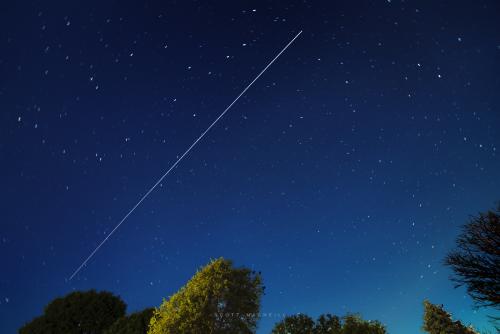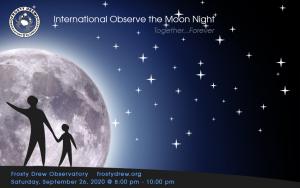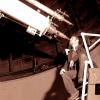Celebration of Space - September 25, 2020
This past week, awesome views of the International Space Station (ISS), passing over the US during the evening hours, resumed. Continuing until October 4, 2020, evening views over our region will continue. Though this past week had the best views of the station, we can still catch good views over the next several nights. The ISS is not always visible during every pass over our region for a few reasons. One, the ISS has to be in sunlight while the observer (on Earth) is in night. As we approach the Winter Solstice, this becomes less and less frequent. Secondly, the ISS orbits Earth inclined 51° to Earth’s equator, which places the ISS over a different part of the sky during each pass. The ISS will generally pass over our region once every 90 minutes, aside from periodic passes that happen above or below our region. But having a pass with all required conditions for visual observation, is significantly less frequent.
Here are notable passes of the ISS happening over our region for the next several nights:
Fri, Sep 25 at 7:36 pm, starting in the NW, rising to 16°, heading towards the NNE
Sat, Sep 26 at 8:26 pm, starting in the NNW, rising to 15°, heading towards the NNW
Sun, Sep 27 at 7:38 pm, staring in the NW, rising to 14°, heading towards the NE
Mon, Sep 28 at 8:28 pm, starting in the NNW, rising to 19°, heading towards the N
Tue, Sep 29 at 7:40 pm, starting in the NNW, rising to 16°, heading towards the NE
Wed, Sep 30 at 8:29 pm, starting in the NW, rising to 25°, and into orbital sunset
Thur, Oct 1 at 7:42 pm, starting in the NW, rising to 24°, and into orbital sunset
These times are applicable to Southern New England, and generally acceptable for the entire Northeast. For pass times specific to your location, visit NASA’s Spot the Station at: https://spotthestation.nasa.gov/. Now set your alarm and step outside to catch humanity’s only continuously inhabited space-based residency passing over, and remind yourself that our greatest accomplishments always happen in the face of danger, not from the safety of our comfort zones!
On Saturday, September 26, 2020 the entire planet will come together to celebrate Earth’s only natural satellite, the Moon. The event is called International Observe the Moon Night and Frosty Drew Observatory will host a celebration in conjunction with this event. This is also our 10 year anniversary celebrating International Observe the Moon Night, over which time, we have seen this event grow from hundreds of organizations to 10’s of thousands of organizations hosting celebrations, world wide. This year’s events have been scaled back dramatically due to the global pandemic, though Frosty Drew is still planning an on-site event, with limited capacity. The night will play out as follows:
We start at 8:00 pm and will have several telescopes set up on the Moon. In the Observatory dome, the primary 16” telescope will focus on notable features and regions of the Moon in high power. Observatory Courtyard telescopes will showcase wide field views of the Moon, with one telescope dedicated to looking at Jupiter, Saturn, and Mars. We will bring back the Lunar Lounge, which as been closed all summer, with a live view of the Moon, from a telescope, projected on the outside wall of the Sky Theatre facility. We will also re-open the Sky Theatre for just this night, and host NASA Solar System Ambassador – Frank Puglia, who will present, to a limited audience, on the the Moon. The Science Center will feature a 12 foot wide panoramic of the Apollo 11 landing site, photographed by the Lunar Reconnaissance Orbiter (LRO). We will rock the Moon until 10:00 pm.
At this time weather is questionable and we will have a better idea of what to expect come Saturday afternoon. Check in on our event page for updates. Additionally, we will send out an update to our mailing list. So gear up and cross your fingers for clear(er) conditions, as we set out for a fabulous night with the Moon, and have a night of introductions with Earth’s only natural satellite – the Moon.
- Author:
- Scott MacNeill
- Entry Date:
- Sep 25, 2020
- Published Under:
- Scott MacNeill's Columns



